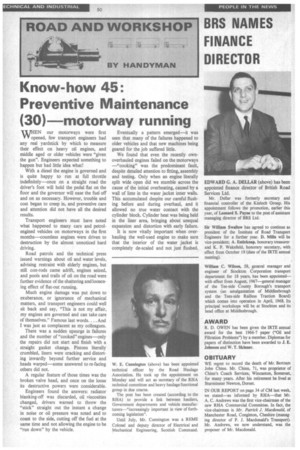Know-how 45: Preventive Maintenance (30) motorway running
Page 52

If you've noticed an error in this article please click here to report it so we can fix it.
VVIEN our motorways were first opened, few transport engineers had any real yardstick by which to measure their effect on heavy oil engines, and middle aged or older vehicles were "given the gun". Engineers expected something to happen but had little idea what!
With a diesel the engine is governed and is quite happy to run at full throttle indefinitely—once on a straight road the driver's foot will hold the pedal flat on the floor and the governor will ease the fuel off and on as necessary. However, trouble and cost began to creep in, and preventive care and attention did not have all the desired results.
Transport engineers must have noted what happened to many cars and petrolengined vehicles on motorways in the first months—countless engines were driven to destruction by the almost unnoticed hard driving.
Road patrols and the technical press issued warnings about oil and water levels, advising restraint with elderly engines, but still con-rods came adrift, engines seized, and pools and trails of oil on the road were further evidence of the shattering and loosening effect of flat-out running.
Much engine damage was put down to exuberance, or ignorance of mechanical matters, and transport engineers could well sit back and say, "This is not my affair, my engines are governed and can take care of themselves." Famous last words. . And I was just as complacent as my colleagues.
There was a sudden upsurge in failures and the number of "cooked" engines—only the repairs did not start and finish with a straight gasket change. Pistons literally crumbled, liners were cracking and distorting inwardly beyond further service and heads warped—some answered to re-facing others did not.
A regular feature of those times was the broken valve head, and once on the loose its destructive powers were considerable.
Engineers found the answers: radiator blanking-off was discarded, oil viscosities changed, drivers warned to throw the "stick" straight out the instant a change in noise or oil pressure was noted and to coast to the side, cutting off the fuel at the same time and not allowing the engine to be "run down" by the vehicle. Eventually a pattern emerged—it was seen that many of the failures happened to older vehicles and that new machines being geared for the job suffered little.
We found that even the recently ownoverhauled engines failed on the tnotorways —"cooking" was the predominant fault, despite detailed attention to fitting, assembly and testing. Only when an engine literally split wide open did we stumble across the cause of the initial overheating, caused by a wall of lime in the water jacket inner walls. This accumulated despite our careful flushing before and during overhaul, and it allowed no true water contact with the cylinder block. Cylinder heat was being held in the liner area, bringing about unequal expansion and distortion with early failure.
It is now vitally important when overhauling the well-used engine to make sure that the interior of the water jacket is completely de-scaled and not just flushed.
W. E. Cunnington (above) has been appointed technical officer by the Road Haulage Association. He took up the appointment on Monday and will act as secretary of the RHA technical committee and heavy haulage functional group in due course.
The post has been created (according to the RHA) to provide a link between hauliers, Government departments and vehicle manufacturers—"increasingly important in view of forthcoming legislation".
Until July, Mr. Ctumington was a REME Colonel and deputy director of Electrical and Mechanical Engineering, Scottish Command.
































































































































